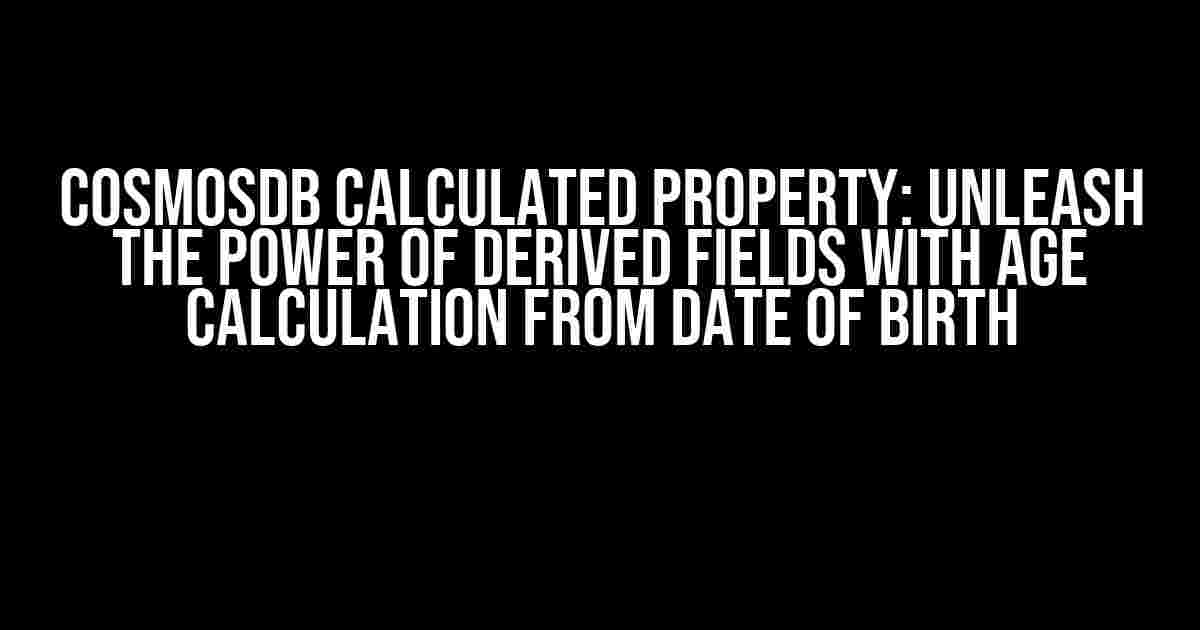Are you tired of manual calculations and complex queries to derive meaningful insights from your CosmosDB data? Do you want to simplify your data processing and gain instant access to valuable information? Look no further! In this article, we’ll dive into the world of CosmosDB calculated properties, focusing on how to create a calculated property to get age from date of birth. Buckle up, and let’s embark on this journey!
What are CosmosDB Calculated Properties?
Calculated properties in CosmosDB are derived fields that are dynamically computed from existing data using a formula or expression. These properties allow you to transform, aggregate, or manipulate your data without altering the underlying data itself. With calculated properties, you can:
- Derive new insights from existing data
- Simplify complex queries and data processing
- Reduce data redundancy and improve data consistency
- Enhance data modeling and schema design
Why Calculate Age from Date of Birth?
Calculating age from date of birth is a common requirement in various domains, such as:
- Healthcare: to determine patient age for medical research, diagnosis, or treatment
- HR and Recruitment: to determine employee age for benefits, pension, or compliance purposes
- E-commerce: to personalize customer experiences based on age demographics
- Social Media: to provide age-based content recommendations or filter out inappropriate content
By calculating age from date of birth, you can:
- Streamline data processing and analysis
- Reduce manual errors and inconsistencies
- Gain timely and accurate insights into your data
Creating a CosmosDB Calculated Property for Age Calculation
Let’s get hands-on and create a calculated property to get age from date of birth in CosmosDB. For this example, we’ll assume you have a container named “Persons” with a property named “dateOfBirth” of type “DateTime”.
{
"id": "1",
"dateOfBirth": "1990-02-15T00:00:00.0000000",
...
}
To create a calculated property, you’ll need to define a formula using CosmosDB’s built-in SQL-like language. For age calculation, we’ll use the following formula:
FLOOR((DATEDIFF(CURRENT_TIMESTAMP, dateOfBirth, DAY)) / 365.25)
Let’s break down the formula:
DATEDIFF(CURRENT_TIMESTAMP, dateOfBirth, DAY): calculates the difference between the current timestamp and the date of birth in daysFLOOR(... / 365.25): divides the result by 365.25 (accounting for leap years) and takes the floor of the result to get the age in years
To create the calculated property, navigate to your CosmosDB container, click on the “Schema” tab, and click “New Calculated Property”. Fill in the details as follows:
| Property Name | Data Type | Formula |
|---|---|---|
| age | Integer | FLOOR((DATEDIFF(CURRENT_TIMESTAMP, dateOfBirth, DAY)) / 365.25) |
Click “Save” to create the calculated property.
Querying and Using the Calculated Property
Once you’ve created the calculated property, you can query it like any other property. Let’s retrieve a list of persons with their calculated age:
SELECT c.id, c.dateOfBirth, c.age
FROM c
The result will include the calculated age property:
[
{
"id": "1",
"dateOfBirth": "1990-02-15T00:00:00.0000000",
"age": 32
},
{
"id": "2",
"dateOfBirth": "1985-10-20T00:00:00.0000000",
"age": 37
},
...
]
You can use the calculated property in various scenarios, such as:
- Filtering data based on age ranges
- Grouping and aggregating data by age
- Creating conditional statements or rules based on age
Best Practices and Considerations
When working with calculated properties, keep the following best practices and considerations in mind:
- Performance Impact**: Calculated properties can impact query performance, especially for large datasets or complex formulas. Optimize your formulas and indexing strategy accordingly.
- Data Consistency**: Ensure data consistency by using calculated properties that are deterministic, meaning they produce the same result for the same input.
- Schema Evolution**: When modifying your schema, consider the impact on calculated properties and adjust them accordingly.
- Security and Access Control**: Implement proper security and access control measures to restrict sensitive data and calculated properties.
Conclusion
In this article, we’ve explored the power of CosmosDB calculated properties, focusing on how to create a calculated property to get age from date of birth. By leveraging calculated properties, you can simplify your data processing, gain timely insights, and unlock new possibilities in your CosmosDB-powered applications. Remember to follow best practices and considerations to ensure optimal performance, data consistency, and security.
Get creative with calculated properties, and unlock the full potential of your CosmosDB data!
Frequently Asked Questions
CosmosDB calculated property to get age from date of birth – the ultimate hack to simplify your data processing! Here are some frequently asked questions to get you started:
What is a calculated property in CosmosDB?
A calculated property in CosmosDB is a feature that allows you to define a property whose value is computed based on other properties in the same document. You can think of it as a virtual column that gets calculated on the fly!
How do I create a calculated property to get age from date of birth in CosmosDB?
You can create a calculated property in CosmosDB by using the `udf` function. For example, you can use the following code to calculate age from date of birth: `udf.age = Math.floor((UnixTimestamp() – udf.getDateOfBirth) / 31536000)`. Replace `getDateOfBirth` with the actual property name that stores the date of birth.
Can I use calculated properties in CosmosDB queries?
Yes, you can use calculated properties in CosmosDB queries just like you would use any other property. You can filter, sort, or project calculated properties in your queries. However, keep in mind that calculated properties are computed at query time, so they may affect query performance.
Do calculated properties affect data storage in CosmosDB?
No, calculated properties do not affect data storage in CosmosDB. Calculated properties are computed on the fly when you query the data, so they do not occupy any storage space. This means you can use calculated properties without worrying about additional storage costs.
Can I use calculated properties in Azure Cosmos DB for MongoDB API?
Yes, you can use calculated properties in Azure Cosmos DB for MongoDB API. Calculated properties are a feature of the core CosmosDB engine, so they are compatible with all APIs, including the MongoDB API.

